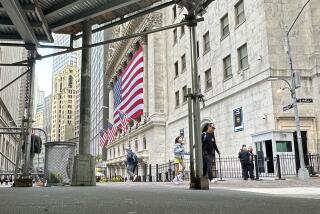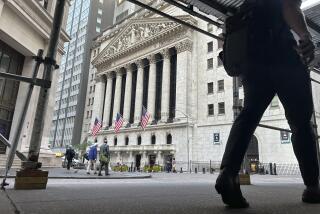Tech Rally Pushes Stocks Back Up
A burst of buying set off an afternoon tech rally on Wall Street on Monday, reversing an earlier sell-off that sent the Nasdaq composite index briefly below the closing low it reached after the Sept. 11 terrorist attacks.
Declining issues outnumbered winners on Nasdaq and the New York Stock Exchange, an indication that the rally was less than wholehearted. Still, the major indexes scored their first advances in nearly a week.
Analysts said the gains in part reflected buying by traders to cover bets that stocks would fall further, rather than any improvement in investor confidence. However, others noted that the market had been sliding for five straight weeks, and was due for a bounce.
“I think we’re sold out,” UBS Warburg’s head equity trader, Robert Harrington, told Bloomberg News. “Maybe people will say, ‘Hey, we’ve discounted a lot of bad news because we’ve been down so much.’ ”
Stocks fell throughout the morning, then turned abruptly higher about 1 p.m. EDT.
The technology-heavy Nasdaq closed up 19.38 points, or 1.3%, at 1,460.34, rebounding from an earlier decline of 26 points that put the index nearly 9 points below its Sept. 21 close of 1,423.19. Sept. 21 marked the end of the first week of trading after the attacks.
Other indexes also recovered. The Standard & Poor’s 500, which had come within 5 points of its Sept. 21 close, advanced 3.58 points, or 0.4%, to 992.72. The Dow Jones industrial average, down 170 points and facing its fourth straight triple-digit loss, rebounded to close up 28.03 points, or 0.3%, at 9,281.82. The Dow remains more than 1,000 points above its Sept. 21 finish.
Declining issues led advancers 3 to 2 on the NYSE and 5 to 4 on Nasdaq. Trading was heavy.
The Dow owed much of its comeback to its tech components, including IBM, Microsoft and Intel. IBM rose 95 cents to $69.70 despite falling early in the session after Goldman Sachs reduced its estimates on the stock because of difficult business conditions. Microsoft climbed $1.88 to $54.16, and Intel rose 60 cents to $19.33.
Still, tech investors were selective. Lucent Technologies dropped 6 cents to $2.28, and telecom giant Nortel lost 18 cents to $1.67 after UBS Warburg reduced its outlook for both companies.
At least some of Monday’s gains were attributed to what is known as short covering.
In a short sale a trader borrows stock and sells it, hoping to buy it back at a cheaper price later. The repurchase is known as covering a short position.
Analysts also said the market got a boost in the last 15 minutes of trading as President Bush began a speech outlining his road map for achieving Palestinian statehood.
Investors’ attention now turns to the Federal Reserve, which begins a two-day meeting today. The central bank is widely expected to leave its key short-term interest rate at a four-decade low of 1.75%, and many analysts say the fragile nature of the economic recovery will keep rate rises at bay until November or beyond.
Many Wall Street pros say they have little faith that a sustained market rally can ensue, as investors remain dogged by fears about anemic U.S. growth and corporate America’s credibility amid a swirl of scandals on Wall Street.
“We are in a show-me state of mind.... [Analyst] upgrades, [strong] earnings and rosy outlooks are what the market is looking for, and we have none of that right now,” said Arnie Owen, managing director of capital markets at Roth Capital Partners.
In other trading, the dollar, after falling early in the day, closed higher against the yen and unchanged against the euro.
Bond yields rose as investors shifted money into stocks. The yield on the benchmark 10-year Treasury note rose to 4.83% from 4.77% on Friday.
In other market highlights:
* European markets fell with the early sell-off in the U.S. Key indexes lost 2.5% in Germany, 1.4% in Britain and 3.4% in France.
* Much of Monday’s rally came from the semiconductor group, with the SOX index of chip stocks jumping 4%. In addition to Intel, gainers in the group included Advanced Micro Devices, up 66 cents to $8.70, and Broadcom, which added $1.22 to $20.24.
But Microsemi of Irvine sank $5.28 to $7.95--a 40% loss--after the chip maker said profit and sales for the current quarter would trail earlier forecasts.
* Defense contractor Raytheon slid $4.17 to $40.95 after the stock was downgraded by Morgan Stanley to “underweight/attractive.”
*
Market Roundup, C8-9
More to Read
Inside the business of entertainment
The Wide Shot brings you news, analysis and insights on everything from streaming wars to production — and what it all means for the future.
You may occasionally receive promotional content from the Los Angeles Times.










